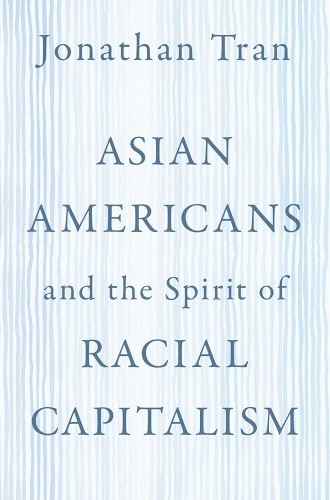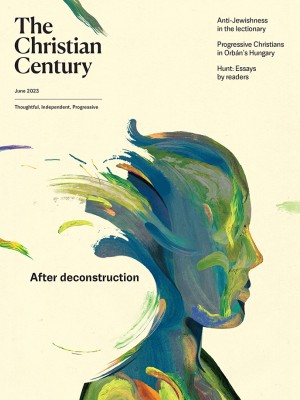Every system gets the results its structure is designed to produce. Some pastors learn this lesson explicitly in pastoral care courses, and others learn it on the ground in congregational ministry. It wasn’t until I heard my most blatantly racist parishioner describe his difficulties paying the bills and his frustrations over being at the mercy of the Veterans Health Administration for health care that I even thought to ask the question, What purpose does racism serve?
In this necessary and challenging book, Jonathan Tran employs a relational ethnography to critique what he deems the reigning orthodoxy on anti-racism and to provide a contrary framework for destabilizing the status quo that Whiteness protects. He documents the histories of two communities, Redeemer Community Church in San Francisco and the Mississippi Delta Chinese, to show how anti-Asian racism in America belies the simplicity of the Black/White binary. By moving from the now normative framework of “identitarian anti-racism” to one of “political economy,” Tran attempts a counterintuitive analysis that, he argues, can lead to imaginative alternatives when it comes to our practices and our politics, especially for Christians.
Read our latest issue or browse back issues.
Tran’s thesis is as simple as it is contrary. He asserts that orthodox anti-racism’s intense focus on racialized identity is a “serious impediment to the work of democratic life on the one hand and political liberation on the other.” Alternatively, he foregrounds the political economy (or what scripture calls the principalities and powers), which originally created the concept of race and racial categories as a means to justify domination and exploitation. In widening the frame of the discussion to better understand the historic purpose racism serves, Tran is returning to the kind of argument mounted long ago by Black thinkers such as W. E. B. Du Bois.
The first half of Asian Americans and the Spirit of Racial Capitalism relies upon an ethnography of the Delta Chinese to critique the identitarian anti-racism that presently holds sway across the public square. As Tran understands it, this is “an approach to racism that begins and ends with racial identity, prioritizing (white) racial identity as racism’s starting point and championing (non-white) racial identity as anti-racism’s end game.” Robin DiAngelo’s bestseller White Fragility is the popular pinnacle of this view, and Tran finds a number of faults with its analysis and solutions.
For one, racial identity as an explanatory concept “has very little to say about Asian-Americans.” The arbitrary term Asian American names too many disparate cultural and linguistic groups to be useful and, presumably, so do other racial identities. “Nobody grows up speaking Asian-American,” Tran remarks, quoting Jay Caspian Kang. “Nobody sits down to eat Asian-American food . . . and nobody goes on pilgrimages to their motherland of Asian-America.” Identitarian anti-racism is structured by a Black/White binary that forces others into its explanatory concept, Tran argues. This leads to corrosive mythologies such as the “model minority myth,” which allows Asian Americans to gain relative access to Whiteness. The normative discourse on racism operates “as if Asian-Americans quietly waiting their turn is the public face of racial solidarity.”
Another fault of identitarian anti-racism, Tran writes, is that it’s overly individualistic. It presupposes that individuals, out of prejudice, act in racist ways that can manifest systemically. It aims to change mindsets through anti-racism training, rooted in the assumption that better ideas lead to better representation, which will lead to better conditions for the oppressed and exploited. This assumption, however, doesn’t sit well with the evidence. Since the 1960s, when diversity, equity, and inclusion training was first normalized in the United States, both the racial wealth gap and racial health-care disparities have gotten worse rather than better. Ideas are not all that have hold of us.
And whence do those racist ideas in individuals come? While in no way denying the totalizing reality of racism, Tran contends that identitarian anti-racism speaks of Whiteness in ontological terms it is reticent to claim; that is, it holds that racism is an ailment innate and indelible to being White. For Tran, this is problematic on two fronts. The first is that it depends upon a racial essentialism (the idea that a White person’s identity is determinatively bound up with the fact of their Whiteness) that originated with White racists. We ought not to be fighting racism using the conceptual terms bequeathed to us by the KKK.
The second problem Tran identifies with the unstated metaphysics of identitarian anti-racism is that it would have us believe that White racists act out of no other motivation or context than prejudice and resentment. Tran believes this is an oversight of convenience. It’s far easier to induce White guilt than to examine what is required to upend the structures that make possible that guilty White person’s way of life. Centering the problem on Whiteness, Tran argues, only ensconces both sides in the status quo.
Tran believes we must destabilize the categories of identitarian anti-racism if we hope to destabilize White people’s attachments to the systems that oppress and exploit others. “It is surprising how rarely anti-racists acknowledge the commanding role racial capitalism has played throughout American history,” he writes, and “the omission suggests that identitarian anti-racism does not fully appreciate the stakes of the matter, nor the possibilities that remain.” He cites sources, such as Noel Ignatiev’s How the Irish Became White, to argue that race is a construct created to justify capitalist exploitation. What color you are is determined by the same social architecture that ensures your first question to any stranger is, “What do you do for a living?”
In the second half of the book, Tran turns his analysis to the systems that racial capital protects and maintains. If, in fact, racism serves a purpose—to justify dominative exploitation—Tran believes anti-racism should undertake two concrete and manageable tasks.
First, it should reduce racialization’s power to aid and abet domination. This task involves relinquishing racist identitarian modes of thought, including the concept of Whiteness. Second, anti-racism should work to upend exploitation as the basis of political economy. Such work requires the searching for and lifting up of “alternative idioms by which political economy is imagined” and practiced. The reigning anti-racist orthodoxy is incapable, Tran argues, of attempting this imaginative political economy because “it separates questions of representation (specifically the representation of constituent identities) from questions of justice. Questions of justice are then hollowed out into questions about who is and who is not represented, where just representation involves mere presence in what amounts to a numbers game.”
In conversation with theologians such as Willie James Jennings, Tran provides a relational ethnography of Redeemer Community Church to illustrate how identitarian modes of anti-racism are impotent to undo the complexities of a political economy based on racial capital and to show how a Christian moral vision can create communities oriented around alternative micro economies. Redeemer is located in the most marginalized area of San Francisco, Bayview–Hunters Point, one of the last remaining Black communities in the gentrified city. The church operates its own software company, which funds its ministry to the community. It has also established a school, Rise University Preparatory, which seeks to address the city’s educational inequality.
Education is a particularly salient instantiation of the limits of identitarian anti-racism, Tran believes. Echoing Martin Luther King Jr.’s lament about the dangers of the White moderate, he writes:
“The fact that it is more often than not liberal progressives who hoard [educational] opportunities to facilitate advantage over African Americans suggests that progressive sympathies arrive as wolves in sheep’s clothing. Indeed, the inability of the most committed progressives to carry through on the promises of liberal modernity suggests that it is nonblack anti-racists that should worry us the most. It is their missional posture and baked-in justifications that are likely to enact the greatest damage. . . . If those most committed to liberation only further harm black life, then perhaps the persistence of antiblackness reveals a reality we not only have failed to come to terms with, but perhaps constitutionally cannot bring into focus.”
In other words, DiAngelo is not nearly radical enough. White people threatened by anti-racist training do not have fragile psyches. They are quite right to feel threatened, for they sense just how much they stand to lose in an alternative political economy.
I’ve led and participated in numerous church studies of books like White Fragility since the murder of George Floyd, and I pastor in a mainline denomination where identitarian anti-racism is such the reigning orthodoxy that at times it appears to have replaced creedal orthodoxy. Over the course of 300 pages, Tran identifies and unpacks what I’ve often observed about such congregational studies and institutional rhetoric—that it very often makes the problem worse by inflaming White people, and, more critically, does not change the situation it seeks to remedy. “We keep getting stuck,” Tran says, “in the trap we’re trying to get out of.”
Much like grace, Asian Americans and the Spirit of Racial Capitalism is a gift we didn’t know we needed until we received it. It provides both a different mode of analysis for which many are hungry and a constructive, if radical, proposal for a way forward beyond a racialized political economy. My only lament about Tran’s work is its thoroughness and thoughtfulness. It is a thick and challenging book, one that many people who desperately need it surely will struggle to navigate. My recommendation of it comes with the hope that Tran will produce a more digestible version for a broader audience.






